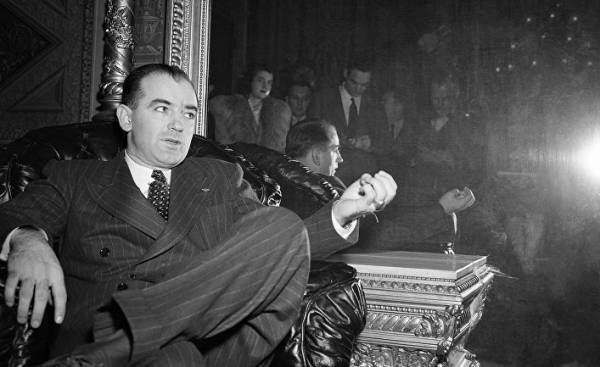
Journalists, historians and policy wonks and interested citizens can hardly think of a more fitting way to productively spend their leisure time than reading a newsletter I. F. stone (I. F. Stone), a fearless and independent journalist during the cold war, which, from my point of view, became the first American blogger, despite the fact that he died before the advent of the Internet. Stone, who was extremely dissatisfied with the oppressive corporatized environment of the leading media and their Pro-government propaganda model and eventually got to black lists major publications for his objections to the anti-Russian reports and interpretations, created his own newsletter, which existed solely by subscriptions, and spent the next 18 years to refute the propaganda distributed by the us government and its partners in the media.
The value of newsletters of Snowy is not the light of history, and in his attempts to tell about the present. When I read his bulletins, the most shocking is how little the situation has changed with the propaganda and militarism of the American government and how little has changed the role that the American media played in their support. When you read his newsletters, the impression that American politics is an endless repetition of the same debates, conflicts and tactics.
In its news bulletins, especially in the 1950-ies and 1960-ies, stone really paid much attention to the methods by which the government instilled in Americans a strong fear of the Kremlin. One passage from an article published in August 1954, is particularly relevant today: it stone explained why it is impossible to stop McCarthyism in America, when — with the aim of preserving the warlike spirit and of US militarism — the Kremlin leaders have relentlessly portrayed as the most terrible and ever-present threat. Except for the changes in the ideology of Moscow — changes that many of the modern followers of McCarthyism openly deny the arguments and explanations of stone are quite applicable to the current situation.
If Communists are some supernatural breed of men, headed developedby some geniuses entrenched in the distant Kremlin, and who joined a satanic conspiracy to take over the world and enslave humanity — these are the ideas constantly inspire us American liberals and conservatives, which echoed day and night all radio stations and Newspapers, the idea that no American no longer dare to challenge, fearing, too, to get to the list of suspects, then how can you deal with McCarthyism?
If you want to prepare the public to the idea of the impending war, if it is taught to take for granted the extermination of millions of people, the vast majority of whom have not experienced the harmful effects of this ideological virus, and who beg us to release them, how can we say that it matters if a few probably innocent people will lose their jobs or reputations because of McCarthyism?
There is need to pay special attention to two points: 1) to support people in fear of a foreign enemy, you must first represent him as omnipotent and omnipresent; 2) once this image is firmly rooted in the minds of people, few will dispute the propaganda of fear to get to the list of supporters of Foreign evil: “the Idea that no American no longer dare to challenge, fearing, too, to get to the list of suspects.”
This tactic is the image of the enemy as omnipresent super villains — were a key component of the war on terror. Radical Muslims were not just a threat, they were extremely dangerous, like the villains from the movies about James bond.
When in a network there were photos of how the American government transported to the place of justice josé Padilla (Jose Padilla), terror suspect, who wore dark glasses and headphones, one American commentator has explained such measures by the need to ensure that he will not be able to secretly submit symbol their comrades. To the question about why terrorism suspects handcuffed and put them gag in her mouth at the time of their transportation to Guantanamo Bay, one official of the armed forces of the United States replied that it is about “the people who are able to cut the hydraulic cable to trigger the crash of the Boeing C-17”. They have the gift of black magic, and they are hiding everywhere, despite the fact that we may not notice. That is why we have so much to fear them, to believe all the statements and to comply with any policy in the name of their destruction.
Few foreign villains were attributed to such omnipotence and omnipresence, which was attributed to Vladimir Putin — at least as long as the Democrats suddenly realized that he is perfect for the role of the villain. The world is full of events, and almost all of them are somehow associated with the name of the Russian leader, and few critics of the Democratic party managed to avoid the stigma of Putin’s supporters or spies for the Kremlin.
Putin like terrorists, “al-Qaeda” (the terrorist organization banned in Russia — approx. ed.) and the Soviet Communists before him — everywhere. Russia is behind all the misfortunes mainly of course, for the defeat of Hillary Clinton in the election. And if someone dares to challenge this statement, it is automatically referred to the traitors who are likely to work personally on Putin.
On Tuesday, February 21, Painting Vanden Heuvel (Katrina vanden Heuvel) wrote in the Washington Post: “In an effort to undermine trump’s many liberals have joined this wave of pamakarista by discrediting anyone who tries to defuse tensions in Russian-American relations, and calling anyone who doubts the validity of the accusations of hacker attacks, Putin apologist… We need not repeat hysteria of the cold war, which thwarts any debate, denigrating skeptics and undermines any attempt at cooperation with Russia in those spheres where it is in our national interests.” This passage has much in common with what stone has written 62 years ago: statements about the penetration and pervasiveness of Russia — that’s the idea, “which no American no longer dare to challenge, fearing, too, to get to the list of suspects.” (The stone is not only called an apologist for the Kremlin in life, but turned into a Stalinist agent after death.)
Over the past year, when Russian hysteria has reached its peak, I wrote a lot on this topic. I am not going to repeat it all.
But I really want to draw readers ‘ attention to a wonderful article in today’s issue of the Guardian, written by an American journalist of Russian origin Keith Gessen (Keith Gessen), in which he analyzes and refutes all these hysterical, ignorant, inflammatory, and manipulative statements about Russia, Putin and the Kremlin, who are now ascendant in American discourse.
This article begins: “As you probably noticed, Vladimir Putin, everywhere.” As a result, as he notes, “palynology” — which he defines as “the writing of reviews and analytical articles about Putin and his motivation, based on inevitably incomplete, insufficient and sometimes completely false information” — is very actively developing, despite the fact that it has existed for about 10 years. Hesse writes: “No other historical moment so many people are so ignorant and so indignant did not Express his opinion on the Russian President.”
The fact that the American media and political commentators often talk about their foreign opponents with a mixture of ignorance and paranoia, has become a tradition of sorts. But, according to him, the role that Putin plays in the first place is that his image allows you to portray all of America’s problems the result of the pernicious influence of foreigners and to save the Democratic party from the need to analyze their weaknesses and mistakes.
As stated in one article, Hillary Clinton and her campaign staff continue to blame your defeat Russia — and therefore Barack Obama, who did not pay attention to hacker attacks until November. In this case, thoughts about Putin help not to think about everything else that went wrong, and about how to solve these problems.
Although banal attempts to justify himself are quite understandable motive, a much more serious danger is that this obsession distracts the public from the ubiquitous corruption that permeates the us ruling class. Hesse writes:
If Donald trump subjected to impeachment and jailed for conspiring with a foreign power to undermine American democracy, I will enjoy it no less than any other American. And yet in the long run playing the Russian card — not just a bad political decision, but also intellectual and moral bankruptcy. This is an attempt to shift the blame for the deep and persistent problems of our country to a foreign power. As noted by some commentators, this is a trick from the Arsenal of Putin himself.
Just last week, said Adam Johnson (Adam Johnson) from the Los Angeles Times, the relentless attempts to put victory trump the actions of foreign forces help not to notice the fact that his rise resulted is American politics and culture. Nothing will help achieve this goal better than the constant imposition of the idea that trump and all the other negative events are the handiwork of the Kremlin leaders.
The game, which leads the Democrat establishment and their allies, is not only immoral, but also dangerous. In the political, media, military and intellectual classes of the United States, there are still very many people who seek confrontation with Russia — including military officials, of which trump has appointed to key positions.
As written, the stone in the 1950-ies, aggression in relation to the suggestion of fear of the Kremlin, as well as criticism of the domestic critics of this approach are closely linked. When one of these aspects are rooted, stop the rest is impossible. And spreading defamatory rhetoric about the external enemy sooner or later trigger — unintentionally or deliberately — a very dangerous confrontation with him.







